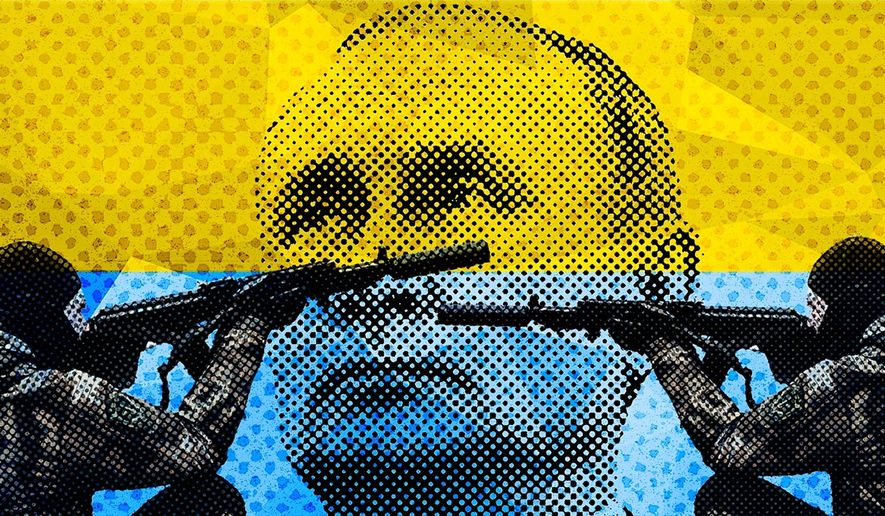OPINION:
The Ukrainian army is about to launch its counteroffensive to take back territory in the east and south and cut off Crimea from occupying Russia. It faces long odds — not merely because President Biden has hesitated in supplying Kyiv with F-16 fighters and long-range missiles but also because NATO and America’s broader strategy for Europe borders on appeasement.
In Europe, the essence of NATO’s posture toward Russia has been deterrence by punishment or retaliation. The border from northeastern Norway through Finland, the Baltic States and Poland with Russia and Belarus is not heavily armed. Should Russia invade and occupy NATO territory, the alliance is prepared to undertake only a delayed counteroffensive.
This was consistent with the NATO-Russia Founding Act of 1997, in which Russia and the West promised to build a durable and inclusive peace based on mutual trust and cooperation. To wit, expecting that Russia would not be threatening to the alliance’s eastern flank, NATO limited troop deployments and did not position any truly menacing weapons, including nuclear arms, in those border nations.
The myth was shattered with Russia’s illegal seizure of Crimea in 2014, but NATO responded weakly, with only limited new deployments in the Baltics and Poland.
Now Russian President Vladimir Putin concentrates his army on Ukraine without fearing a NATO incursion along the border and confident that NATO — and specifically the United States — won’t use their superior air power to destroy his supply lines, air force and equipment in Ukraine.
Mr. Putin has drawn red lines — any engagement with NATO forces and out come the nukes. Fearing Mr. Putin’s reaction, Mr. Biden has also failed to equip Kyiv’s with Army Tactical Missile System, or ATACMS, MQ-1C Gray Eagle drones and ground-launched small diameter bombs. That gives Russian forces sanctuary in Crimea.
Effectively, Mr. Putin has defined the rules to give him the best chance of winning and seized a free hand to commit all manner of atrocities with little fear of reprisal.
Mr. Putin, not Mr. Biden, defines American security policy in Europe.
Lacking credible air support, the Ukrainian army must undertake a high-risk “combined arms approach” that carefully choreographs infantry, armor, combat engineers and air defenses, something only the U.S. Army, among the Western allies, is capable of doing.
Seeing this appeasement of Mr. Putin, Iran, Saudi Arabia and China are emboldened. In the competition for the hearts and minds of important developing nations, America should be viewed as a sometime, half-committed friend, easily cowed.
Reliance on sanctions is a poor substitute for kinetic power. Led by India and South Africa, developing nations outside the Western alliance and the China, Russia, Iran, Saudi Arabia and North Korean axis of autocrats can plead neutrality, while their businesses buy Russian oil and ship to Russia the electronics and weapons that Western sanctions supposedly deny.
Moreover, China is a more important economic partner by size of trade and aid through its Belt and Road initiative for many emerging economies. With the U.S. displaying such manifest weakness on defense and security, China’s efforts to build an alternative to the dollar system can’t help but gain traction.
With the United States displaying such frailty in the face of threats what to do we offer? The Indo-Pacific Economic Framework is the template for Mr. Biden’s approach to trade and economic cooperation with emerging economies, but it is nothing more than revanchist protectionism and mercantilism. Mr. Trump’s America First policies in “woke” wrapping paper!
Brazil will clear transactions with China in yuan. The BRICS are exploring an alternative to the dollar, and that club has many applicants for membership.
What happens in Ukraine will happen in Taiwan next, and it is high time NATO went on an aggressive footing. Forward deploying whole brigades along its border with Russia and Belarus — capable of offensive incursions — and establishing a no-fly zone over Ukraine and supplying the missiles and aircraft Kyiv needs to take the war into Russia.
The NATO alliance can do a lot if Mr. Putin dares challenge the Western military. The U.S. military is capable of sinking his navy in the Black Sea and Mediterranean — including missile cruisers and escort ships — and military assets in Syria and Libya.
We can deliver a demarche to Iran demanding it cease arms shipments or face destructions of its factories and ships on the high seas.
After Mr. Putin’s atrocities, we should want more than an economically viable and defendable Ukraine without challenging Mr. Putin’s regime as Mr. Biden says.
The Russian people are growing despondent. They might give us Mr. Putin’s head on a pole, and that would surely affect Chinese President Xi Jinping’s appetite for Taiwan and India’s fence sitting.
The dollar would continue to prevail as the global medium of exchange until a more reasoned American foreign economic policy is crafted by a future U.S. administration.
• Peter Morici is an economist and emeritus business professor at the University of Maryland, and a national columnist.




Please read our comment policy before commenting.